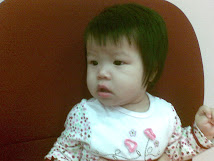Dad fully agrees with Uncle Mark's comments about helping the child to find and understand their personal strengths
(based on his earlier comment in the previous entry in Structured Learning). Yet, it is important to pre-face that the 'routined structured' learning goes beyond the intent of delivering learning outcomes of subject matters like Math/Science.
To dad, the cognitive engagement is the more 'accessible' platform for searching of answers- of self, content and others- and reaching for meaning. The activities need be thoughtfully designed to allow Joshua to learn about problem-solving, decision-making, critical thinking and creative thinking. More importantly, dad was sconsciously building affective skills to help Joshua understand himself and the world around him a little better. Dad hopes to use the activities as an "
act of innovation (which is) both cognitive and emotional." (Goleman, 1998) According to Goleman "coming up with a creative insight is a cognitive act- but realising its value, nurturing it and following through calls on emotional competencies such as self-confidence, initiative, persistence, and the ability to persuade" (p.100).
The idea to connect emotionally through the activities is just as important (some would argue that its more). Researchers like Amabile (1987) and Torrance (1983) also wrote that the direct effects of affective states, such as motivation and passion, can hugely impact ability to create as well. For daddy's Emergenetics profile (strongly bimodal- conceptual and social thinker; strongly expressive, assertive and flexble behavioural preference) he either battles or leverages his strong emotions i.e. anxiety, love, hate, anger, to influence his own thinking- in both positive and negative ways really. In this activity, dad engages his strong affective attributes to design the activities to help Joshua. Butler (2002) state that being affective means ways "in which we deal with attitudinal and emotional aspects of learning, including feelings, appreciation, enthusiam, motivations, attitudes and values" (p.3)
Explicitly, dad aims to facilitate the behaviours listed in Krathwol, Bloom, and Masia's (1964) descriptors of
- receiving (being aware, willing to hear, selectively attentive)
- valuing (the worth of something as evidenced by a person's acceptance and commitment)
- organising values (comparing, relating, synthesizing the worth of things to resolve discrepancies and to create a unique value system), and
- internalising values (exhibiting a value system that controls behaviour in a pervasive, consistent, characteristic manner).
Finally, on the part of the parents, what kind of mindset is important to underpin the process of interaction? I believe the following attitudes ascribed to effective facilitation in change leadership applies also to facilitating creative parent-child communications:
- openness to novelty (being able to entertain ideas that may at first seem outlandish or risky <especially dealing with the ideas of a child>)
- tolerance for ambiguity (able to deal with uncertainty and to avoid leaping to conclusions)
- tolerance for complexity (being able to stay open and persevere without being overwhelmed by large amounts of information, interrelated and complex issues, and competing pespectives) (Puccio et al., 2007, p.51-52)
Amabile, T. M. (1987). The motivation to be creative. In S. G. Isaksen (Ed.), Frontiers of creativity research: Beyond the basics (pp. 223-254). Buffalo, NY: Bearly limited.
Butler, B. H. (2002, September). Learning domains or Bloom's Taxonomy adapted for public garden educational programs. Starting right: Project planning and team building in informal learning.AABGA professional development workshop.
Goleman, D. (1998). Working with emotional intelligence. New York: Bantam.
Krathwohl, D. R., Bloom, B.S., & Masia, B.B. (1964). Taxonomy of educational objectives: The classification of educational goals. Handbook II: Affective domain. New York: McGraw-Hill.
Puccio, G. J., Murdock, M. C., & Mance, M. (2007). Creative leadership: Skills that drive change. Three Oaks, CA: Sage Publications, Inc.
Torrance, E. (1983). The importance of falling in love with something. Creative Child and Adult Quarterly, 8, 72-78.
 photo of the 'futuristic' looking ark constructed using Lego bricks yesterday.
photo of the 'futuristic' looking ark constructed using Lego bricks yesterday.







.jpg)
